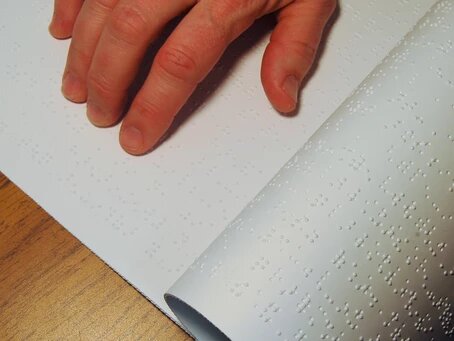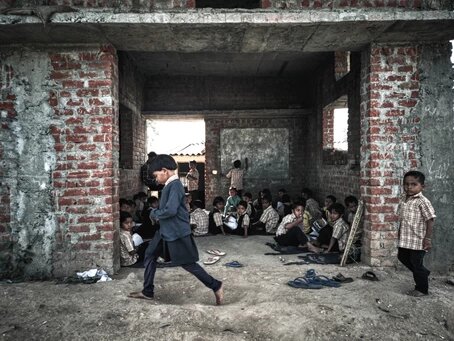Uwe Maurer once quoted that, “We have no special needs children, we only have just
children…with special needs.” The quote has wider connotation and relevance because the
onus is on society and government to cater their needs, children are just children. Mahatma
Gandhi once said “if we wish to create a lasting peace we must begin with the children”.
Peace and harmony will only have an everlasting impact on society if the children are well
socially included. World Bank defines social inclusion as the process of improving the terms
on which individuals and groups takes part in society, improving ability, opportunity and
dignity of those that are disadvantaged on the basis of their identity. India being a welfare
state caters to all the needs of every section of the society including the specially abled ones.
Developing countries have the highest number of specially-abled children. According to
census 2011 India has 26.8 million persons with special needs. The State of education report
of India: children with disabilities reveals that there are 78,64,636 children with disability in
India which is 1.7 percent of total child population. Recent World Bank report reveals that
India has forty to eighty million people with special needs and illiteracy, poverty,
unemployment is highest among them. United Nation observed International year of
disability in 2001 to accommodate, rehabilitate and ponder over the thought as how to make
special needs people more socially inclusive in society.
Nelson Mandela is of the view that “Education is the most powerful weapon which can be
used to change the world”. But the recent UNESCO report released in July 2019 reveals that
around 75 percent of children with disabilities don’t attend schools in India and there is surge
in dropouts with each successive level of schooling. Report said that three-fourth of children
with special needs at the age of five-years and one-fourth between five to nineteen year do
not attend school or any other educational institution. Large number of children enrolled
themselves in distance learning but thereafter there is significant decrease in that number too.
Inclusive education implementation on ground level is a complex task which requires a very
fine understanding of the needs of children with special needs. Behavioral change is the first step which should be changed. The teacher should come up with new innovative mechanism to teach and engage students. It should not be disability of the children which comes at the forefront but it should be the ability of teacher which should comes in. Learning environment
should be made inclusive.
The role is parents is also utmost important when we talk about social inclusion of children
with special needs besides providing them physical amenities, ICT technology and devices of essential necessity. Government comes up with various policies for children with special
needs but the execution of these policies is still missing which deprives millions of children
with disabilities from gaining essential skills and education. However, there are many
institutions which are working tirelessly to make their university and school curriculum
accessible to all kind of learners. Yet there is still a need is to abolish various hurdles.
Different leaders in education field should come forward and collaborate with different
government departments, policy makers, entrepreneurs and made the education accessible
and affordable for children with special needs. We must keep in mind that social inclusion is
not all about education of children with special needs but it is also about sensitizing and
educating the society about the different needs of the children with special needs. Parents and teachers take reasonable measure in providing them with a facilitative environment of
engagement in a therapeutic manner, using home owned resources so that these children
never feel anxiety and distress. Storytelling, music classes, playing with bunch of other
children is always helpful to make the socially inclusive. However, the most important is
attitude change towards them.
India has made significant progress in terms of policies to make the children with special
needs socially inclusive but the onus remains on the society which should change their
attitude towards them therefore, various behavioral change seminars and training
programmes should be conducted to spread the awareness. Various measures like
commencement of schemes which enhances the enrolment of children with special needs is
the need of hour in education sector so that we can fulfil the Sustainable development Goal
no. 4 which talks about inclusive and affordable education for all types of learners.
Coordination of various department and ensuring effective funds allocation for the betterment
of the children with special needs is the long pending goal. Expansion of ICT technology and
transformation of teaching practices according to the needs of the specially abled children
and last but not the least overcoming stereotypes towards children with special needs will
help them more socially inclusive in the society.
References
Avalanne D’Souza; Indian Express; 23june2020; How to support children with learning disabilities amid
COVID-19 pandemic; https://indianexpress.com/article/lifestyle/life-style/how-to-support-children-special-needs-6470363/
Reena Gupta; Financial Express;8 June 2018; Creating an inclusive classroom: Persons with disabilities needeasier access to higher education; https://www.financialexpress.com/opinion/creating-an-inclusive-classroom-
persons-with-disabilities-need-easier-access-to-higher-education/1197937/
Dr B. Balaji; The Hindu; updated 5April2020; Sensitising parents of children with special needs https://www.thehindu.com/news/national/tamil-nadu/sensitising-parents-of-children-with-special-needs/article31260029.ece#!
World Bank; Social Inclusion; https://www.worldbank.org/en/topic/social-inclusion
Katrina L. Barker and Ors.; January 2015; ResearchGate; Inclusion of Children with Special Needs in Early Childhood Education.
Education Review Office New Zealand; December 2012; Inclusion of Children with Special Needs in Early Childhood Services; https://ero.govt.nz/assets/Uploads/Inclusion-of-Children-with-Special-Needs-in-Early-https://ero.govt.nz/assets/Uploads/Inclusion-of-Children-with-Special-Needs-in-Early-Childhood-Services.pdf
Daria Mrsic;22 June2017; The conference “The right to inclusive education”, Sarajevo, Bosnia and Herzegovina
Shari Tarver-Behring, Michael E. Spagna and James Sullivan; JSTOR; School Counselors and Full Inclusion for Children with Special Needs.
India Today; updated 4July2019; 75% of children with disabilities don’t attend schools in India: UNESCO
Samagra Shiksha Department of school Education & Literacy, Ministry of Education, Government of India; Inclusive Education for children with special needs http://samagra.mhrd.gov.in/inclusive.html
Sanjana Krishna; November 2017; Children with special needs in India https://www.indianfolk.com/needs-children-special-needs-india/
United Nation; International Day of Persons with Disability https://www.un.org/en/observances/day-of-persons-with-disabilities
UNESCO; Education for all global Monitoring Reort;
http://www.unesco.org/new/fileadmin/MULTIMEDIA/HQ/ED/pdf/Facts-Figures-gmr.pdf




